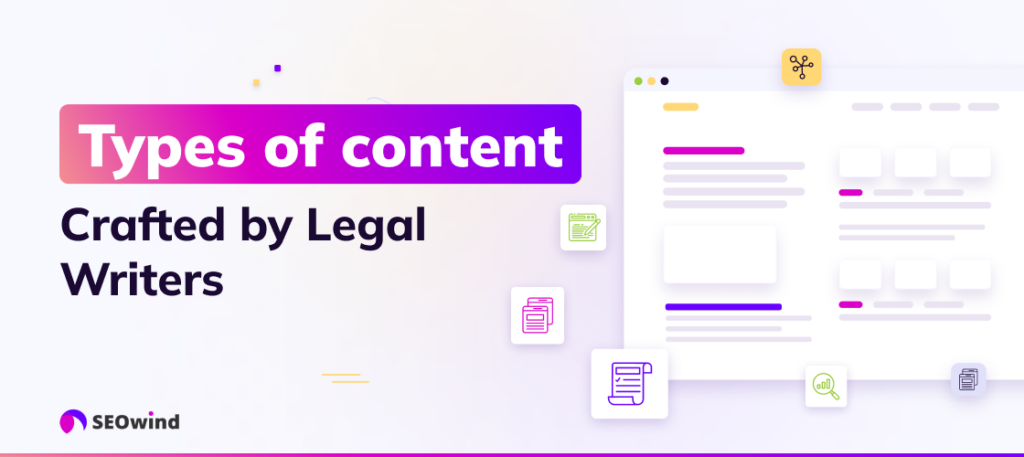Top Law Firm Content Writer | Engage & Convert Clients!

The digital landscape has transformed how law firms attract and convert potential clients. Quality content, meticulously crafted by a top law firm content writer, can be the decisive factor between standing out in a sea of online competitors or being overlooked. This article examines the crucial role of expert legal copywriting in improving your online presence, establishing credibility, and ultimately driving client conversion.
Lawyerly eloquence might win over judges in courtrooms, but when it comes to engaging potential clients on your website, a different kind of language comes into play. Understanding complex legalese isn’t everyone’s second nature! So how, then, can you communicate your expertise effectively while meeting user intent? It all begins with tailored legal content writing.
Let’s dive into what legal content writers do and understand why they could be indispensable to your law firm’s business growth strategy.
What do Legal Content Writers Do?

The primary responsibility of a legal content writer is translation: transforming intricate legalese into comprehensible language for individuals seeking legal support. Legal writers compose riveting blog posts, craft compelling service pages, inform through newsletters, and so much more – always with an aim to engage readers and turn them into prospective clients.
Here’s a curated list detailing tasks undertaken by top-notch legal copywriters:
- Conduct comprehensive industry research: To demystify complex topics in layman’s terms requires a profound understanding of various areas of law, such as real estate, criminal defense, or personal injury (to name just a few). Legal writers are well-versed in statutory rules, regulations, and recent case laws.
- Write persuasive & informative articles/blogs: Regular posting of authoritative blogs serves multiple purposes like displaying competence in specific practice areas and addressing key concerns/questions potential clients might have.
- Build strong keyword-driven SEO strategies: Good SEO practices go a long way in enhancing online visibility. A legal writer’s task thus encompasses researching high-performing keywords and incorporating them naturally into content.
- Craft engaging website content: Legal copywriters are instrumental in writing service pages, testimonials, and other essential sections of the law firm’s website. The purpose? To lend an articulate voice to your firm’s ethos and services.
- Creating educational email campaigns/newsletters: Well-written emails or newsletters help nurture leads and keep existing clients updated with recent industry news or changes.
Skillful management of these tasks attracts prospective clients, increases site visits, and promotes higher user engagement rates – all leading to more client conversions! Intrigued about how this could benefit your law firm? Read on!
Benefits of Law Firm Content Writing Services

Taking advantage of professional content writing services can markedly transform the online presence of your law firm. Far from being a simple task, crafting well-resonating and compelling content takes skill, time, and a deep understanding of both legal complexities and the intricacies of digital marketing.
Showcasing Legal Expertise to Potential Clients
A primary advantage centers around showcasing your firm’s expertise. Concisely written articles that shed light on complex legal issues not only exhibit engaging thought leadership but also act as direct evidence of depth in knowledge. Simply put, they allow potential clients to see that you understand their concerns and have mastered the nitty-gritty of effective advocacy and legal maneuvering.
This serves as an opportunity to resonate with them personally while explaining intricate details about why your practice is a perfect fit for their needs. Subtly presenting this kind of information within content can act as a substantial differentiator between your law firm and its competitors.
Boosting Online Visibility and Search Rankings
Next up on the list – enhanced online visibility! Consider law firm website content as practical fuel powering your search engine rankings. Applying smart SEO strategies combined with high-quality content helps improve where you land in organic search results—critical considering nearly 96% of people utilize search engines when seeking legal advice.
With regular creation and distribution of optimized, relevant law firm content, you effectively lure Google’s algorithms’ attention while enhancing site visits—a double-edged sword boosting credibility and initiating client conversion increments!
Establishing Trust and Credibility in Your Practice Areas
Finally, yet importantly, professionally crafted content establishes trust—an area pivotal to any attorney-client relationship! By consistently delivering accurate insights through blogs or newsletters related to your practice areas, potential clients perceive you as an informative, reliable resource.
Consider drawing patterns wherein each informative piece links back to how deftly your law firm handles such situations, craftily instilling greater confidence and trust in your capabilities. The cumulative influence of highly beneficial law firm content writing can help not only attract but also retain clients, therefore improving overall satisfaction rates!
In essence, the right content unequivocally increases domain authority, improving the likelihood that your firm’s website becomes a sought-after reference point for legal inquiries. It attracts, engrosses, and encourages action—a perfect trio that could potentially lead to significant growth for your law firm.
A broad range of stakeholders in the legal industry can immensely benefit from expert legal copywriting. They include but are not limited to:
- Law Firms: Large to mid-sized law firms striving for an enhanced online presence and reach can leverage meticulously crafted content for lawyers to engage potential clients, educate their audience on different aspects of law, and showcase their expertise effectively.
- Solo Practitioners: Independent attorneys seeking a robust individual brand need quality content that echoes their persona, outlines their service offerings precisely, and helps establish credibility in the minds of potential clients.
- Legal Tech Companies: Legal technology companies offering innovative solutions such as case management software or AI-driven contract analysis tools need strong content marketing efforts to explain how these evolving tech offerings can benefit prospective users.
- Paralegal Service Providers: Providers offering paralegal services or support tasks related to litigation, real estate transactions, or corporate matters require focused B2B content outreach that underlines their value propositions clearly and persuasively.
- Legal Education Institutions: Law schools and e-learning platforms teaching law-related courses can harness educational blog posts, newsletters, or instructive long-form articles woven around relevant topics to attract learners and boost course enrollments.
Remember this: Perfection might be impossible. Still, it’s worth pursuing. By making use of top-notch legal copywriting services, you position yourself as an expert in the field who values precision – echoing one vital tenet lawyers swear by – attention to detail!
Types of Content Crafted by Legal Writers

As a content writer specializing in legal topics, I’m often faced with various requests for different types of content. While every law firm’s needs are unique, there are several common styles of legal website content that consistently prove effective.
Persuasive and Informative Blog Posts
Blog posts play an instrumental role in attracting visitors to your site because they provide valuable information tailored to potential client’s concerns and inquiries. However, within this wealth of information is an undercurrent designed to persuade readers toward your services skillfully.
The real power lies in the marriage of these two traits – informative yet persuasive. By addressing hot-button issues or frequently asked questions about specific legal fields, you subtly showcase your expertise on the matter. As you continuously demonstrate clues of credibility and comprehensive understanding throughout these blog posts, prospective clients naturally start seeing you as an authority worth entrusting their cases to.
Educational Newsletter and Email Campaigns
Expanding from your site itself, let’s drift into another horizon- newsletters and email campaigns. To keep followers engaged and informed can be quite taxing if there’s no well-planned strategy involved, but here’s where educational newsletters and emails outshine.
Newsletters allow ongoing communication with interested parties who’ve willingly provided their contact information – a clear sign that they’re open to more from you than just occasional website visits. Emails serve dual purposes; they not only keep your firm at the forefront of subscribers’ minds but also deliver important updates or insights that illustrate continuous engagement in the around-the-clock evolving legal landscape.
Thus, leveraging such platforms for educational content creates an air of transparency while directly nurturing leads at the same time.
Detailed Service Pages and Practice Area Descriptions
Detailing service pages, along with stats-driven practice area descriptions, are essential parts of high-quality lawyer content because they immediately guide any visitor seeking specific services or areas of expertise on your site.
Service pages offer clients concise spectacles into how you can help them, providing a quick snapshot of your offerings that’s easy to understand at a glance. Practice area descriptions take this a step further, elaborating each service with more depth and context.
These pages become even more compelling when real-life cases or results are incorporated, as it not only promotes confidence amongst potential clients but also fuels validity for your claims.
Each form of content fosters different layers of connection with potential clients – from educational emails nurturing initial interest to authoritative blog posts winning their trust right up to detailed descriptions solidifying their decision to choose your services.
How can AI support legal copywriting?

The advent of artificial intelligence (AI) has revolutionized many industries, and Law Firm Content Writing is not an exception. Let’s embark on a riveting journey exploring how AI supports legal content creation to boost your law firm’s visibility and client conversion rates.
Enhancing Efficiency and Productivity (from research to article drafts)
- Rapid Research: The efficiency offered by AI in the field of legal research is remarkable. It can effectively analyze multiple online sources, case studies, and recent precedents in a fraction of the time it takes a human writer. By automating this process, which would normally be laborious and time-consuming, there’s more time left for writing intriguing pieces.
- Smart Drafting: Once armed with sufficient information from its meticulous research phase, AI tools adeptly compose initial drafts. With each iteration, linguistic models are improved – thus ensuring every piece feels more natural and less robotic than the last.
- Review Process Automation: With their ability to detect grammatical errors and suggest improvements based on context, advanced language model algorithms facilitate better editing experiences promoting error-free content.
Streamlining the Copywriting Process with AI
AI packages a host of attractive benefits within its digital chambers! Be it brainstorming topics or shaping up final edits – automating these tasks fosters exceptional workflow efficiency.
For instance:
- When it comes to generating unique blog post titles related to the keyword’ blog attorney’, state-of-the-art NLP (Natural Language Processing) engines work wonders!
- Drafts are polished, keeping consistency in tone through sophisticated sentiment analysis tools.
- Feedback loops on draft versions are automated, leading to increased productivity rates.
In essence, it’s about leveraging technology smartly to catalyze creative processes without compromising on quality.
Improving SEO
Acknowledging that search engine optimization is paramount for an elevated internet presence? You’re thinking right. AI can offer highly practical solutions to improve your firm’s online visibility.
- Keyword Analysis: AI-powered tools can analyze vast volumes of data, identify user search patterns, and suggest optimal keywords for your blog posts.
- SEO Audits: It automatically flags issues hampering the SEO performance of your website and recommends measures to rectify them.
- Content Optimization: By integrating AI with machine-learning algorithms, content creativity is enhanced while also ensuring perfect alignment with SEO protocols. This ensures not just creating content but crafting it strategically to rank high in search engine result pages (SERPs).
Whether you’re an individual legal blogger or a law firm looking to grow its digital outreach – embracing AI for copywriting processes will surely be a game-changer!
Artificial Intelligence (AI) has presented itself as a game-changer in providing content for numerous industries, and the legal profession is not an exception. Its ability to deliver high-quality, highly targeted content tailored towards law firms cannot be underplayed.
Variety of Legal Content
AI can craft various types of content used by law firms. This includes blog posts on assorted legal topics, service pages outlining areas of expertise, and engaging newsletters that keep clients updated concerning regulatory changes or fascinating case studies. AI is also proficient at creating informative Landing Pages designed to drive web traffic while serving potential clients’ specific needs.
Legally Compliant Content
One unique aspect that distinguishes AI-powered legal writing involves the production of legally compliant content. With its ability to analyze and comprehend vast amounts of legal data quickly, AI can produce write-ups adhering to ever-changing laws and regulations – ascribe it to AI’s rapid-update capabilities.
SEO-Friendly Legal Articles
Importantly, too, AI shines brightly when it comes to crafting SEO-friendly articles for law firms. By continuously learning about ranking factors from countless websites across the internet, these smart algorithms provide detailed insights into keyword preferences, which they use to craft SEO-optimized content strategically.
How SEOwind can help with legal copywriting

SEOwind can revolutionize the way your law firm manages its content creation. Particularly, it provides vital support in four significant areas: conducting rapid content and keyword research, writing blogs and articles driven by data, aligning the text to match your unique tone of voice, and bringing relevant traffic to your website.
Fast-track content and keyword research
The first crucial step in any content creation journey involves intensive research — something that SEOwind expertly handles. It quickly digs into vast databases to extract pertinent information, such as keywords and trending topics. This AI tool takes away the tedious task of manually hunting for keywords within your specific legal niche. As a result, you save time and reduce effort while gaining access to valuable insight, which will considerably strengthen the quality of your law firm’s online presence.
Write AI articles and blog posts based on research and SEO data
SEOwind doesn’t stop at providing excellent research; it uses this data effectively, too. It incorporates high-priority keywords naturally into articles or blog posts catering specifically to the interests of your prospective clients. The structure of these articles is aligned not just with search engine optimization best practices but also with user readability standards.
Align content to your tone of voice
Having consistency in tone across all communication platforms presents a coherent brand image, another important aspect that SEOwind skillfully appreciates. Whether you aim for an authoritative voice filled with legal jargon or prefer a simplified approach focused on laypersons seeking legal advice, this software intelligently senses your way of articulation and replicates it dynamically in every block of written content.
Drive relevant traffic to your legal website
Finally, what point would there be if all this excellently crafted content doesn’t reach your desired audience? SEOwind understands this quite well. It helps optimize each page of your site, enabling it to rank higher in search engine results and, therefore, become more visible to potential clients who are seeking legal assistance. By drawing relevant traffic to your website, SEOwind enhances the probability of converting these visitors into potential leads or clients.
In a nutshell, if you’re a law firm looking to evolve digitally with consistent, high-quality content that genuinely reflects your brand values, boosts online visibility, and successfully engages prospective clients – SEOwind should be on top of your list as an indispensable ally in your journey!
The Writing Process for Law Firm Content Writer
Use a structured process to generate content that is both engaging and effective. This approach not only ensures high-quality writing but also makes good use of the rich diversity offered in legal content writer jobs. Let’s break down that process:
Topic Selection: Meeting User Intent and Search Demand
Choosing the right topic plays a crucial role in determining how useful your text will be to readers and whether or not it meets search demand. Do you want to answer common questions about tax law? Or perhaps provide an intricate understanding of business laws for entrepreneurs? By aligning topics with what potential clients are actively seeking out, you’re setting up your articles to be a valuable resource.
Signal your expertise by exploring areas often shrouded in confusion or diving into recent happenings like new policies, amendments, or notable cases. Given the nature of law being people-centric and ever-changing, there’s always something relevant to write about.
Thorough Legal Research Techniques
Legal research requires precision and diligence – traits necessary when combining statutes, regulations, case laws, and other resources. Extensive knowledge about these critical aspects forms the backbone against which any top-notch content related to legal matters stands sturdy.
While statutes can make information accurate, it’s just as essential to keep them updated due to frequent legal changes; old data may present misleading insights otherwise. Strong research also extends beyond these specific elements – observations documented by leading practitioners make compelling additions, too! Always validate from multiple trusted sources; accuracy cannot be compromised when interpreting the law.
Writing with Clarity, Precision, and Authority
Creating outstanding work while undertaking legal blog writing jobs demands exceptional language usage where clarity meets precision. Strike a balance between using formal terminologies inherent in law-related articles and ensuring user-friendly writing that appeals even to non-jurists.
Draw on digestible examples and story-telling practices for explaining complex legislation issues. Remember: your aim isn’t just to inform but also to make the read enjoyable. Take care not to lose the reader in jargon overdose!
Moreover, writing with authority exudes confidence and credibility, amplifying trust among your readers – an essential factor when their legal concerns are at stake.
In essence, it all boils down to understanding users’ intent, going beyond surface-level research for total accuracy, and crafting well-written content that intertwines clarity and precision while demonstrating authoritative expertise. Happy writing!
Content Optimization of legal content for maximum reach
To truly captivate your audience and leave a mark in a crowded digital space, more is required than just creating excellent content. Not only do you need to catch the attention of your potential clientele, but you must also make sure that search engines find your legal blog enticing as well. This is where optimization steps in. Let’s unravel this term further.
Keyword Research and Integration
The first step toward optimizing content involves conducting substantial keyword research. Keywords are those significant words relevant to your law practice that users input on search engines when seeking out legal services or legal advice online.
Choosing the correct keywords helps string the bridge between what people are searching for and the content you create for them. Here’s how to approach it:
- Understand Your Audience: Analyzing website analytics can provide insights into words or phrases potential clients often use.
- Use SEO Tools: There’s an abundance of platforms like SEMrush or Google Trends that assist in identifying popular terms related to the legal industry.
- Analyze Competitors’ Sites: Looking at other law firm blogs might uncover frequently used terminologies that draw traffic to their sites.
After you unearth these golden nuggets called keywords, the next task entails integrating these seamlessly into your text – title, headers, body content, and meta descriptions, among others – enhancing visibility while maintaining the coherency and lucidity of your message.
On-page SEO Tactics Tailored for Legal Websites
Switching gears now towards another essential factor contributing mutually towards a successful blog post reach – On-Page SEO tactics specifically designed with law-oriented websites in mind.
Meta Descriptions: Meta descriptions offer insight into your article before readers click on it from a SERP (Search Engine Results Page). Relevant keywords embedded within summarizing yet engaging snippets increase click-through rates and enhance SEO performance.
URL Structure: Structuring URLs strategically gives way for a better user experience – short, descriptive URLs with relevant keywords expressing the subject of your content are preferred.
Page Speed: Minimize loading time for pages. High page speeds augment user experience and improve search engine ranking – more critical in the mobile-first index world we live in.
Internal Links: Strategically linking relevant articles within your blog post eases site navigation and boosts the potential to rank higher on SERPs. For law firms, this could stretch as far as cross-referencing different practice areas or relating case studies to services.
Optimizing legal blogs demands careful planning – integrating researched keywords and implementing tailored on-page SEO practices can lead you toward maximum reach and engagement online. It’s solely through thoughtful integration of all these elements that you can achieve a comprehensive digital strategy aiming for greater visibility and engagement. So, walk down this bridge of meticulously crafted keywords on a well-placed pathway of SEO to make an impact out there!